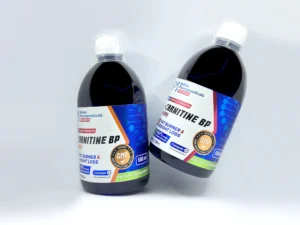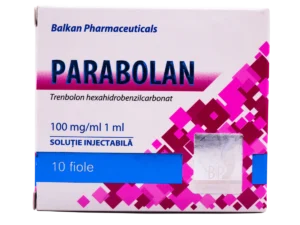L-carnitine (also levocarnitine) – is an natural substance related to group B vitamins, it performs a number of important functions in the body, it is not a fat burner, but a carrier of adipose tissue in muscle mitochondria, where under aerobic exercise this adipose tissue is converted into energy.
L-carnitine is often called a vitamin-like substance, but it is not a vitamin, since the body can synthesize it on its own. The level of L-carnitine is homeostatic, all of its excess is effectively eliminated from the body, and it does not accumulate excessively.
L-carnitine was first isolated by V.S. Gulevich and R.Z. Krimberg in 1905. In 1962, the physiological role of carnitine was revealed – it transports long-chain fatty acids to mitochondria through the inner membrane.
By its physical properties is a white crystalline powder, hygroscopic, readily soluble in water. There are two stereo isomeric forms. Only L-form has biological activity. D-carnitine is harmful to the body, as it is a competitive antagonist of L-carnitine.
In the human body, it is present in the muscles and liver.
L-carnitine biosynthesis
L-carnitine is synthesized in the liver and kidneys, from which it is transported to other tissues and organs. The synthesis of levocarnitine proceeds with the participation of vitamins C, B3, B6, B9, B12, iron, lysine, methionine and some enzymes. With a deficiency of at least one of the components, L-carnitine deficiency with impaired body functions may develop, which, however, is rarely observed, often only with a genetic defect in the enzymes responsible for the synthesis of L-carnitine.
Functions and effects of L-carnitine
Fat burning
L-carnitine carries out the transport of fatty acids (structural elements of fat) into the mitochondrial matrix, where they are destroyed with the release of energy. An additional intake is carried out in the hope of intensifying the destruction of fats.
Increase mental and physical energy
As shown by the results of a double-blind, placebo-controlled study conducted in 2007 in Italy, the administration of L-carnitine in a daily dose of 2 g for 6 months led to an increase in mental and physical activity. Subjects noted improved mood, increased stamina, and increased overall tone. In fairness, it should be noted that for most athletes the results of this study are hardly indicative in view of the fact that 66 people aged from 100 to 106 years were tested in it.
Stress tolerance
L-Carnitine Studies have proven the effectiveness of carnitine in increasing stress tolerance and enhancing the adaptive capacity of the human body.
Detoxification
L-carnitine maintains the level of free CoASH, which is involved in the neutralization of organic acids and xenobiotics, necessary for the functioning of some enzymes and for the normal functioning of the Krebs cycle.
Anabolic functions
The anabolic effect of L-carnitine was established experimentally, during experiments using this supplement; scientists noticed that the subjects not only lost fat, but also increased lean muscle mass. The mechanism of this action has not yet been fully studied; however, there are a number of theories that explain the anabolic effect of carnitine by its participation in the exchange of phospholipids, optimization of the balance of Acetyl-CoA/CoASH, large use of fat as a source of energy, and improvement of neurotransmission.
Lowers cholesterol
L-carnitine reduces harmful cholesterol, thereby preventing the narrowing of blood vessels in the heart and brain, and prevents heart attacks and strokes.
Protects the heart and blood vessels
First of all, this effect is realized by lowering cholesterol, which affects small coronary vessels. In addition, L-carnitine improves myocardial metabolism, has an antioxidant effect. Clinical studies have shown that, after a course of carnitine, people with heart disease were less likely to complain, and myocardial function improved.
Other effects
L-carnitine has a neuroprotective, antihypoxic, antioxidant and antithyroid effect, prevents apoptosis and osteoporosis, and also stimulates tissue regeneration.
L-carnitine: harm and side effects
The effectiveness of additional doses of L-carnitine has been called into question by a number of researchers. Thus, according to meta-analysis, low efficacy of L-carnitine in athletes was shown, for women who are overweight, carnitine inefficiency (4g/day) in combination with regular cardio loads (4×30 min/week) was shown.
L-carnitine in food
The main food sources of L-carnitine are meat, fish and dairy products. The daily norm of this substance (300 mg) is contained in about 300-400g of raw beef; moreover, a significant part of levocarnitine is lost during the heat treatment of meat, this fact necessitates taking carnitine in the form of additional additives.
L-carnitine in sports
Carnitine is important when it is necessary to increase general and special endurance in aerobic sports (running, swimming, rowing, etc.) If the athlete is not concerned about weight loss, maximum energy gain can be achieved by combining levocarnitine with an increased amount of fat in the diet. There is a special high-fat diet, which is prescribed simultaneously with large doses of carnitine. This method of enhancing bioenergy is especially preferred when it is necessary to avoid a drop in body weight during training.
Levocarnitine enhances endurance in both aerobic and anaerobic (powerlifting, bodybuilding, etc.) sports. It should be noted that the anabolic effect of levocarnitine can be masked by a general decrease in body weight as a result of the disappearance of subcutaneous fat and internal fatty tissue. Therefore, when evaluating the anabolic effect of carnitine, one should be guided by criteria different from indicators such as body weight and limb volume. In this case, this is the percentage of fat mass and total body weight.
To achieve maximum effect, levocarnitine should be used along with a well-balanced diet and training program. Levocarnitine is not a dope and can be used in sports nutrition without any restrictions.
In the absence of initial synthesis disorders in the body, it is recommended to use short courses, since with prolonged use, withdrawal syndrome is observed – the production of one’s own levocarnitine is reduced and there is a need to constantly take an exo-preparation.
L-carnitine for muscle protection
A daily dose of 2 grams of L-carnitine protects the muscles of athletes from destruction, according to a study by sports scientists from the Islamic University of Azad in Iran, published in the “Journal of Sports Medicine in Asia.”
Researchers divided 22 physically active young people into two groups. One group took a placebo for two weeks. Another group took a supplement containing 2 g of L-carnitine. Two weeks later, the researchers conducted a 15-minute test run. The researchers also analyzed the blood of the subjects: before taking the supplement, immediately before the race, immediately after the race, after 2 hours and after 24 hours.
Results:
During the run, the concentration of markers of muscle damage — the enzymes lactate dehydrogenase (LDH, LDH) and creatine kinase (CK) in the blood of the subjects increased, but this increase was noticeably lower in athletes taking carnitine. It turned out that L-carnitine reduces the degree of damage to muscle cells.
TBARS (reactive thiobarbituric acid compound – TBKRV):
Is a marker of free radical activity. These aggressive molecules released during intense physical activity can damage the structure of cells. During the race, the concentration of TBARS in the blood of the subjects increased, but the growth was noticeably lower in athletes who took L-carnitine.
Conclusion:
The two-week oral intake of L-carnitine supplements has a mild effect on lipid peroxidation, on muscle cell damage and increases antioxidant activity. However, the exact mechanism for the weakening of oxidative stress markers by L-carnitine has not been established and requires further study.
Combination with other supplements
L-carnitine goes well with all types of fat burners, potentiates their effect and reduces the frequency of side effects. L-carnitine can also be taken during mass gain cycles to prevent fat formation by taking it with protein, gainer and any other complexes.
The combined use of carnitine and coenzyme Q10 preparations is considered effective, since their action is aimed at 2 main points of application: reactivity (L-carnitine) and psychological system resources (coenzyme Q10).
Mode of application
Doses of carnitine from 500 mg to 2 g per day are considered optimal (usually a single dose is 500 or 750 mg in 3 divided doses, or 1000 mg in 2 divided doses). Exceeding 2 g does not make sense, since studies have not revealed any advantages of higher doses. Take L-carnitine 30 minutes before exercise and in the morning on an empty stomach. On training-free days, also take in the morning and afternoon also between meals. It is in the morning and during exercise that L-carnitine has the highest activity.
Good research before moving to the buy supplements department in Balkapharm Online Store ensures that you don’t tend to the wrong steroid. Gender, age and other environmental factors are effective in manifesting side effects.








